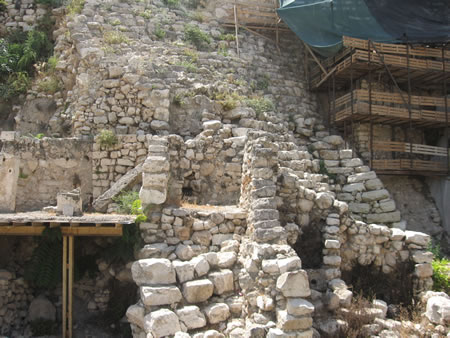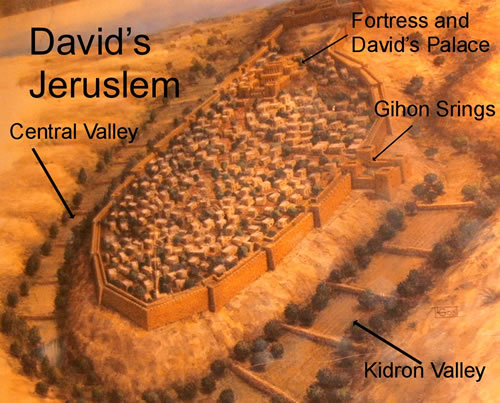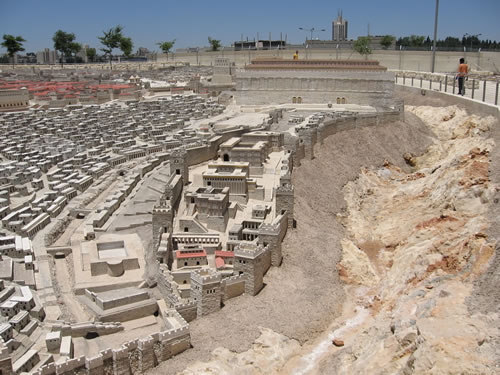Melchizedek
Hebrews 7:1-10
Melchizedek is the topic here because
the readers are considering turning from Christianity and back to the Levitical
system so they can be TRUE sons of Abraham.
The author is saying:
1) Jesus is a
priest like Melchizedek was
2) Abraham
honored Melchizedek. So honoring Jesus
as High Priest is exactly what Abraham would do.
The author is focusing on Jesus being a
perpetual high priest so he goes to Psalm 110:4 to build on “the order of
Melchizedek.”
7:1
“This
Melchizedek, was king of
Melchizedek is mentioned in:
1) Genesis
14:18-20 – Abraham took a vow and swore to “God Most High, maker of heaven and
earth” before the priest Melchizedek in Gen. 14:18-20.
2) Psalm 110:4
Melchizedek (or, Melchi-Zedek) was the
king of an ancient city-state called
1) Jud
19:10, 11 – “But,
unwilling to stay another night, the man left and went toward Jebus (that is,
2) 1Ch
11:4. – “David
and all the Israelites marched to
The city was called
In Joshua day the king of
Adoni-Zedek was killed in Joshua’s
invasion (Joshua 12:7, 9) but the city was not taken until David took it in 1
Chronicles 11:4-9 and 2 Samuel 5:7-12.

Jebusite wall from days of Salem and Jebus. This wall is located on the east
side of the City of David, just north of the Gihon Springs. See more of this Wall HERE

This is David's city of Jerusalem which is the same city of Melchizedek and Adoni-Zedek.
See the Gihon Springs, Joab's enterance, Hezekiah's tunnel and the Pool of Siloam HERE

This is a picture of a model of the city of Jerusalem from 70 AD.
You can see the portion of the city known as the City of David with the temple in the
background. The pool of Siloam is in the bottom left.


Notice the City of David, the ancient city of Salem or Jebus, with the citadel on the northern wall.
This city was built on the old ancient rock core situated between the Kidron Valley on the east and the Tryophoeon (Central) Valley on the west.

This is a photo of Galyn under the City of David (Salem, Jebus or Jerusalem) walking through
the water of Hezekiah's tunnel that was cut out through the old ancient core that the city is built on.



“He
met Abraham returning from the defeat of the kings and blessed him,”
7:2
“and
Abraham gave him a tenth of everything.”
Amazingly, one thing that is not
mentioned is the fact that the priest Melchizedek brought out “bread and
wine”. It seems it would be a perfect
opportunity for the author to mention the Lord’s Supper. Men like Cyprian (bishop in 249 AD) and
Ambrose (338-397) later in church history connect Melchizedek’s offering of
bread and wine to Jesus offering of his body and blood. Again, the same order of priesthood.
“First,
his name means ‘King of righteousness’” then also, ‘King of
“
The Hebrew word “sedeq” which means
“righteousness” is considered by the author and by Philo to be the meaning of
Zedek in both Melchizedek and Adoni-Zedek.
7:3
“Without
father or mother, without genealogy, without beginning of days or end of life,
like the son of God he remains a priest forever.”
In the Levitical priesthood the
genealogy was most important. All
priests had to prove their father’s genealogy back to Aaron or loose their
priestly standing.
Here is a classic example of an
argument from silence. Since
Melchizedek’s genealogy is not mentioned the author uses it to say it doesn’t
exist.
Part of the inspiration of scripture
may have presented him this way to preserve him as a type of Jesus, the true
high priest.
Melchizedek is in a type what Jesus is
in reality: Eternal.
In scripture’s account Melchizedek was
never replaced and continues as a priest forever. Jesus is a priest forever in reality.
But, Melchizedek is a real person with
a real geneology:
1) He comes from
a line of kings called Zedek.
2) 7:6 clearly
says that he had a genealogy: “This man, however, did not trace his descent
from Levi.”
Why Melchizedek is not Jesus in the OT
or a Theophany:
1) He is said to
be “made like the Son of God”. Why say
this if he IS the Son of God? (7:3)
2) Psalm 110:4
says the Messiah will be a priest “after the order of Melchizedek.” This makes a clear distinction between the
Christ and the man, Melchizedek.
3) Melchizedek
was a citizen of an earthly city who lived his life as a king and priest in
ancient
4) To connect the
name Zedek (righteousness) with Jesus, the king of righteousness, will not work
when you add the name of one of the Jebusite’s wicked kings, Adoni-Zedek, into
the mix.
7:4
“Just
think how great he was: Even the patriarch Abraham gave him a tenth of the
plunder!”
The word “plunder” or “spoils” is the
Greek word “akrothinion” which means
“top of the heap.” The Greeks would gather the spoils of a military victory and
place them in a heap. The top or the
best part of the heap was presented to the gods.
7:5
“Now
the law requires the descendants of Levi who become priests to collect a tenth
from the people – that is, their brothers – even though their brothers are
descended from Abraham.”
Numbers 18:21-32, The Levites received
tithes from
The right to tithe someone indicates a
certain authority or right. This is not
a inherent superiority as if they were a better person but an official
superiority.
7:6
“This
man, however, did not trace his descent from Levi, yet he collected a tenth
from Abraham and blessed him who had the promises.”
First Superiority:
Abraham willing gave the tenth of his
own free will but Melchizedek did receive it which indicates he recognized his
position as a priest and accepted the tithe.
7:7
“And
without doubt the lesser person is blessed by the greater.”
Second Superiority:
This is the point of a blessing. The superior approves and accepts the work of
the lesser. It also says Melchizedek
blessed Abraham. This means more than he
wished him well. The blessing were
God’s words of approval spoken through his priest Melchizedek to Abraham.
7:8
“In
the one case, the tenth is collected by men who die; but in the other case, by
him who is declared to be living.”
Third Superiority:
Again the superiority of the priesthood
of Melchizedek is at hand.
The Levitical priesthood was constantly
replacing the high priest since he would die.
But, Melchizedek is never recorded as dying.
7:9-10
“One
might even say that Levi, who collects the tenth, paid the tenth through
Abraham, because when Melchizedek
met Abraham, Levi was still in the body of his ancestor.”
Fourth Superiority:
Levi is seen as being present in
Abraham when the tithe was paid.
So, Melchizedek is superior to Levi
which includes the entire priesthood
The Four Proofs of Melchizedek’s
Superiority:
1) Abraham gave
him tithes
2) Melchizedek
accepted tithes indicating his superior position
3) Melchizedek’s
priesthood was not replaced, but Levitical priesthood would die and constantly
be replaced
4)